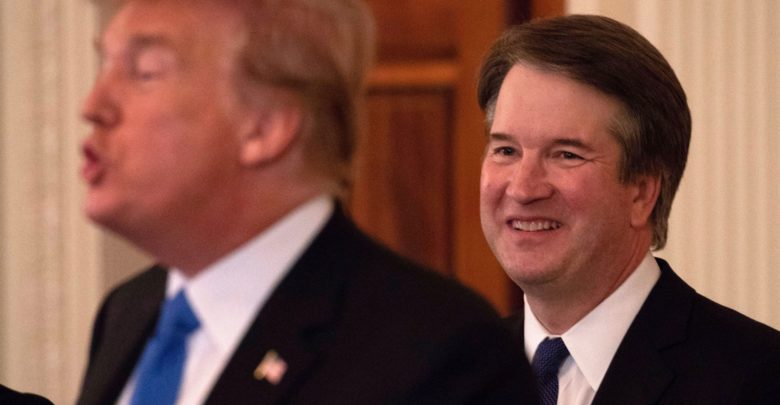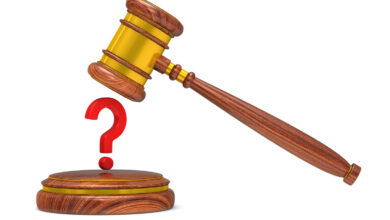Kavanaugh Poses A Big Threat To The Mueller Probe
He would likely find it unconstitutional

The confirmation of Brett Kavanaugh to the Supreme Court could strike a lethal blow to Special Counsel Robert Meuller’s investigation into Russian interference with the 2016 presidential election.
And it has nothing to do with Kavanaugh’s views on whether a sitting president can be criminally indicted or investigated, a subject to which commentators have recently paid great attention.
To be sure, Kavanaugh has staked out an extreme position on immunizing sitting presidents from any sort of criminal accountability. Is he really arguing that a president shouldn’t be held criminally accountable, or even investigated, if he orders a hit on a political rival? Or sells vital state secrets to an enemy? Apparently so. His writing contains no suggestion of any exceptions to the rule he favors.
But this position, extreme as it is, doesn’t necessarily indicate that Kavanaugh, as a Supreme Court justice, would rule that the Constitution prohibits a criminal investigation against a sitting president.
Kavanaugh’s writings don’t quite make that argument. Instead, he has urged Congress, as a matter of policy, to pass a law exempting sitting presidents from criminal exposure. It would not be unreasonable to interpret this argument as an indication that Kavanaugh does NOT believe that the Constitution contains any such prohibition. Why ask Congress to pass a law prohibiting conduct if that conduct is already prohibited by the Constitution?
In other words, advocating congressional action could be passed off as a tacit admission that the matter is not already settled by the Constitution.
Kavanaugh will likely throw his weight behind a challenge to the constitutionality of the Mueller investigation
Not so with regard to Kavanaugh’s likely position on a related issue that gets even closer to the heart of the Special Counsel investigation: the constitutionality of the legal authority under which Mueller is operating.
Kavanaugh’s judicial record on the separation of powers, and specifically on attempts to limit the authority of a president to control the Executive Branch, strongly suggests that, given the opportunity, Kavanaugh will throw his judicial weight behind a challenge to the constitutionality of the Mueller investigation.
The Special Counsel regulation under which Mueller was appointed was designed in part to protect the Special Counsel from political interference by the president. Under its terms, a president has no authority to direct or supervise the Special Counsel. That power lies exclusively with the Attorney General or the Deputy Attorney General if, as in this case, the Attorney General has recused himself.
More importantly, the Special Counsel regulations do not allow a president to terminate an investigation or fire the Special Counsel. That, too, is left to the Attorney General, and even the Attorney General must show good cause.
Since the Special Counsel provision was created by a Department of Justice regulation, not an act of Congress or a court ruling, the Special Counsel is a creature of the Executive Branch of our government, over which the President of the United States has constitutional authority.
Therein lies the rub, at least as Kavanaugh would most likely see it.
The independence of the Special Counsel from presidential interference is both the intended virtue of the law and, at the same time, its potential Achilles heel
Although the Special Counsel is a creature of the Executive Branch, the head of the Executive Branch, the President, has extremely limited authority to control the Special Counsel. Ironically, this is both the intended virtue of Special Counsel regulation and, at the same time, its potential legal Achilles heel.
Judge Kavanaugh’s Circuit Court decisions strongly suggest that he will find this limitation of presidential authority unconstitutional.
In 2008, the DC Court of Appeals issued a ruling upholding the constitutionality of the structure of the Public Company Accounting Oversight Board. The PCAOB was created by an act of Congress that gave the power to appoint and remove its members to the Securities and Exchange Commission, an agency within the Executive Branch. The Court of Appeals upheld the PCAOB charter, rejecting a challenge it was an unconstitutional restriction of the president’s power to give the SEC, not the president, the authority to hire and fire the members of the PCAOB.
But Judge Kavanaugh dissented. He would have found PCAOB’s structure unconstitutional because it “effectively eliminates any presidential power” to control the agency.
Kavanaugh took the same position earlier this year when his Court of Appeals upheld a law limiting the president’s power to fire the Director of the Consumer Financial Protection Board. Again, Kavanaugh dissented, arguing that the limitation on presidential authority over an agency within the Executive Branch was unconstitutional because it gave the Director too much independence from presidential control.
If the Court strikes down the Special Counsel law, the best that could happen would be that Trump would be empowered to fire Mueller and shut down the investigation
No great leap of logic is required to predict how Kavanaugh will apply these views to the Special Counsel provision. Like the statutes in the PCAOB and CFPB cases, the Special Counsel’s charter impinges upon Executive authority by restricting the president’s power to fire somebody operating within the Executive Branch of the government. There is simply no reason to believe that Kavanaugh will find that restriction any more justified in the case of the Special Counsel than he did in the cases of the PCAOB and the CFPB.
If Kavanaugh becomes the deciding vote in a decision holding that the Special Counsel law unconstitutionally limits presidential authority, the best that can happen is that President Trump would be handed direct authority to fire Mueller. The worst is that the entire Mueller investigation would be delegitimized and terminated.
Of course, Kavanaugh alone could not strike down the Special Counsel regulation. But he could be the 5th and decisive vote in doing so.
Justice Kavanaugh’s view on this matter likely would be very different from that of the man he is replacing, Justice Kennedy. Justice Kennedy was a somewhat unpredictable swing vote on matters of separation of powers, but certainly not a reliable vote with the conservative justices. A scholarly analysis by two law professors of Kennedy’s constitutional jurisprudence on separation of powers describes Kennedy as rejecting the approach of both the conservative and liberal ideological extremes, keeping the Court “in a balanced, centrist approach on these issues.”
We would have a more precise reading on how Kennedy might have viewed the constitutionality of the Special Counsel’s charter if he had participated in the Supreme Court decision in a case that presented an almost identical issue, Morrison v. Olson.
Morrison was a Supreme Court decision in a case that questioned the constitutionality of a 1978 statute that empowered a “Special Prosecutor” to investigate and prosecute allegations that a former Assistant Attorney General had lied to Congress. The challenge to that law was virtually identical to an expected challenge to the current Special Counsel law: since the law restricted the power of the president to fire the Special Prosecutor, it was claimed to be an unconstitutional impingement on the president’s constitutional authority.
The Court, with a very different ideological makeup than it has now, held otherwise. It found that even though the Special Prosecutor was to some degree independent of Executive Branch supervision, the law did not “unduly” burden the authority of the Executive. Sufficient executive control was retained, the Court held, to enable the president to perform his constitutionally assigned duties.
Justice Scalia, of course, dissented.
Justice Kennedy, in an action bound to be invoked during the Kavanaugh confirmation hearings, recused himself. He did not give a reason, but he was newly appointed to the Court, and it was widely believed that he was concerned that there could be an appearance of partiality if he took part in a decision that was bound to impact government officials with whom he had had prior dealings.
Senate Democrats will call upon Kavanaugh to follow Kennedy’s lead. They will push Kavanaugh for a commitment to recuse himself in any case challenging the validity of the Mueller investigation. Most likely he won’t make that commitment.
In the end, if Kavanaugh doesn’t recuse himself, and if he winds up participating in a decision on a case challenging the constitutionality of the Special Counsel, we can’t know for certain how he will come down on the issue.
But we know enough to be concerned that he could be a fatal threat to the Mueller investigation, and that’s reason enough to oppose his confirmation.





I’m enjoying your articles Philip. It would be moot if Muller would finish his investigation. I would hope he is close considering it’s going on over a year now.
Philip,
Great analysis on Kavanaugh and his threat to the Mueller probe. As a concerned citizen, but not a lawyer, this is something I had never thought of before your article. Thanks for the wake- up call!
Kat